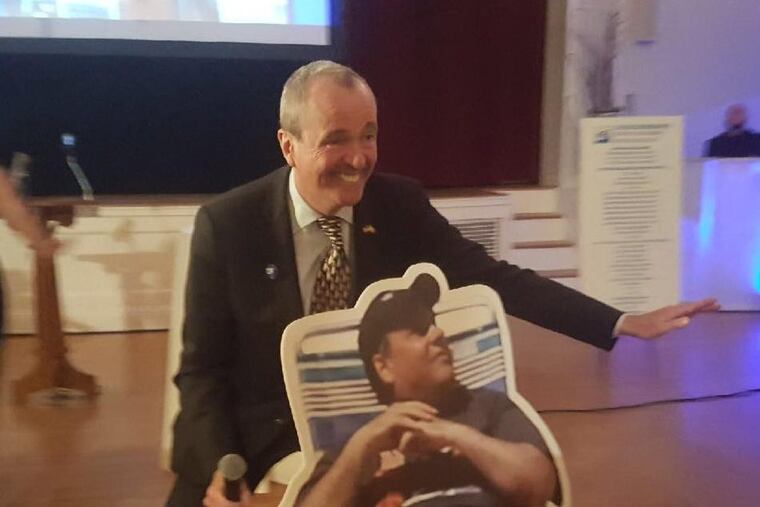My would-be bromance with Phil Murphy proved too taxing
New Jersey's new governor came in on a wave of post-Christie, post-Trump enthusiasm among progressive Democrats. But for this columnist, the honeymoon ended quickly.

Gov. Murphy and I have so much in common that a bromance between us seems written in the stars.
Like me, he's a boomer, the proud product of a hardworking, JFK-loving, Irish American family in Massachusetts with a house too small for all the kids.
He got his first job at 13, as did I, although our career paths diverged: I began by delivering newspapers and ended up writing for them, and Phil left an under-the-table dishwashing gig in the dust and became a Wall Street millionaire.
He and I both emigrated from the Bay to the Garden State, where I vote for governor and he got elected governor.
Murphy did so by campaigning as a progressive's progressive, speaking so progressively so often about so many things — everything, really — that he made the Trump administration's garish anti-progressive pageant look even more appalling.
Which I admit was appealing.
It also was uplifting to watch him fervently, if not feverishly, touch every imaginable progressive base and espouse every imaginable progressive notion, so much so that I could almost dismiss my misgivings as imaginary.
After a year with Donald (seems longer), eight years with Chris (ditto), and a year without Barack, I really was ready to embark on a political, philosophical, perhaps even spiritual affair with our new governor.
But Phil, the thrill is gone.
Because I simply can't afford to have a fling with an old-fashioned, unabashed — I'll give you that — tax-and-spend liberal whose new budget calls for $1.6 billion in tax hikes.
And I don't believe New Jersey can afford it either, regardless of the governor's well-intentioned promises to increase public education and public pension funding.
Murphy has taken an easy-and-breezy attitude about "restoring" what he regards as Christie's meaningless reductions in the state sales tax.
"The last thing you want to do is cut the sales tax," he explained, or non-explained, during the Ask Governor Murphy show. It recently debuted on public radio, rather than the commercial, and potentially far less congenial, NJ 101.5 airwaves.
Christie once held court on that lively, conservative-friendly talk station, and Murphy (like Trump) seems intent on continuing his election campaign by lambasting and occasionally ridiculing his predecessor at nearly every turn.
This despite the gracious words the new governor had for Christie in his inaugural address, a rather sweet (and short) oration featuring scoops of platitudes sprinkled with bits of bipartisanship.
There was even a line (a throwaway one, but a line nonetheless) about "the promise of property tax relief" — a pipe dream for communities receiving no additional municipal aid dollars from the Murphy administration. Although the governor is urging towns to share services to save money.
The governor's own budget address outlined a $37.4 billion spending plan he said would make New Jersey "stronger and fairer."
A noble goal, to be sure — NJ Transit, for example, went from role model to punchline during Christie's reign, and fixing it will be costly.
But Murphy's speech was far less than noble in failing to mention who, other than millionaires and Uber riders, will pay (answer: the rest of us) and how much (too much) for big and bigger Trenton's wish list.
The governor is an enthusiast about the fiscal healing potential of legal recreational weed.
Predictions of a windfall of between $850 million (the governor's estimate) and $1 billion (according to lawyers on his health-care transition committee) are, I must admit, rather intoxicating.
But while Phil seems like an abstemious fellow, he pretty much supports marijuana for all, if not stores selling marijuana at the mall. To adults, of course.
Those adults among us who view weed legalization at best as ill-timed, and at worst as ill-advised in the midst of a deadly opioid addiction epidemic, are unswayed by Phil's rather idealistic view of cannabis as a fiscal panacea.
As well as a physical cure-all: Half the state's population could qualify for medical marijuana under his administration's latest proposal, which expands the list of ailments in need of weed to include anxiety.
Will that cover the sort of anxiety arising from worry about the cost of continuing to live in New Jersey?